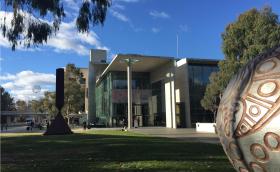Image via Pixabay
If the artist was central to Whitlam’s vision of the Australia Council the years since have not been kind to her fundamental role.
Over time, the Australia Council turned into an agency that spent the majority of its budget funding a select coterie of favoured institutions: the 28 major performing arts companies that still account for more than half its total budget. Once smaller companies are included, funding for organisations now accounts for more than three-quarters of the agency’s spend. Support for individual artists, or small groups, represents something less than ten per cent.
The Hawke Government’s decision to give the major companies their own quasi-autonomous unit within the Australia Council, confirmed by Keating’s Creative Nation policy, has shaped the way Australian cultural policy has been structured since.
The institutional heft of the major performing arts companies continues to dominate policy discussions; as Julian Meyrick points out, the majors-indies divide determines ‘the distribution of cultural subsidy.’ And the key justification for that subsidy is currently ‘excellence.’
We encountered the word ‘excellence’, courtesy of George Brandis’ 2013 election debate at the Casula Powerhouse. His enthusiastic adoption of the term reflects the victory of a certain view of Australia’s political economy.
‘Excellence’, a code word, a handy signifier that equated to an unashamedly ‘high art’ view of culture. In policy terms it means support for the major performing arts sector. In this analysis, articulated by Brandis as about ‘the great audiences’, what matters in culture are the great works of the tradition. These are the canonical classics representing the pinnacle of enlightened humanity: Western orchestral music and opera, Shakespearian theatre and European old master painting.
This view is not held by many artists themselves, who can be iconoclastic in their tastes. But it is widely held by Liberal politicians, by the Commonwealth arts bureaucracy and amongst the professional company directors of the corporate world who populate the boards of major cultural institutions.
‘Excellence’ is also an attractive value to those in the business community enamoured of neoliberal concepts like ‘competition’ and ‘risk’, as we shall explore in more detail below. As I argued in Overland last year, the point about excellence was precisely not an artistic one.
No national cultural policy can coherently articulate what ‘artistic excellence’ even is, let alone devise a policy which procures more of it. Instead, ‘excellence’ was simply the name given to the policy of supporting the major companies and institutions–those big companies that attracted the support of the elite class of art-loving bank CEOs, company directors and merchant bankers.
The Australia Council Review commissioned by then Minister for the Arts Simon Crean is the perfect example: it was conducted by Angus James, a merchant banker who also happened to be deputy chair of the Australian Chamber Orchestra, and Gabrielle Trainor, a company director and spin doctor who had previously sat on the board of the Sydney Symphony.
With the ‘excellence’ narrative firmly supported by the incoming Coalition arts minister, the suspicion was always that any funding cuts implemented by the Abbott Government would be deflected from the major companies, and would instead fall on the rest of the Australia Council’s client base. And that is exactly what happened.
This article is an extract from the Platform Paper When the Goal Posts Move: Patronage, Power and Resistance in Australian Cultural Policy 2013–16 by Ben Eltham published by Currency House today. Eltham. Lawyer and 3RRR presenter Michelle Bennett, and independent artist David Pledger will launch the paper at an open event at 6pm on 8 August at Collingwood Arts Precinct. Bookings essential.






